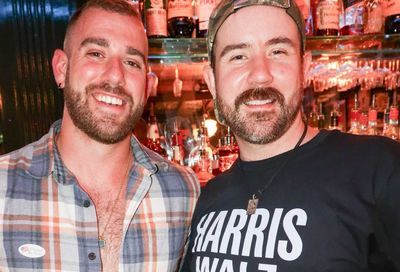Hand to God star Liam Forde on puppets, performing and politics
In Hand to God, Liam Forde brilliantly portrays not one, but two characters. One is a withdrawn teenager. The other, a demonic, foul-mouthed puppet named Tyrone. Who knew that felt could be so monstrous?

“This is the only speaking I’ll do today until the show. I do not speak on the weekends. I steam before and after every performance. I take baths. I get massages. I just do everything I possibly can, because it is taxing.”
Those lucky enough to have caught Liam Forde’s bravura performance in Hand to God at Studio Theater know just how taxing a role it is.
In the darkly funny, deeply alarming comedy, the 27-year-old actor plays not one role, but two: that of Jason, a fervently religious, small-town Texas teen coping with the recent death of his father through his church’s puppet ministry (run by his emotionally battered mother) and Jason’s puppet creation, Tyrone, who may or may not be demonically possessed. It’s a chilling, funny, clockwork-precise performance that leaves you dumbfounded, not just because of Forde’s gifts as an actor, but because it haunts you long after the show has ended.
“Liam is an incredibly special performer,” marvels Joanie Schultz, the play’s director. “Even though he had no puppetry experience, he’s a pianist and a singer, so he has these capabilities. He’s good with even just the placement of his voice.
“Tyrone is his own character, his own person,” she continues. “Liam is Jason to me and then Tyrone is something else. He’s like another person. It’s so crazy because I know logically that Liam is playing both roles, but to me Tyrone is like this other thing.”
The key to Forde’s natural, seemingly effortless abilities with Tyrone may, in fact, be tied to his childhood.
“Liam would probably kill me for telling you this,” the Chicago-based director says, “but one day we were talking about what the puppet does, how the puppet becomes this intermediary communicator — he’s able to say all these things Jason couldn’t say without the puppet. And Liam suddenly remembered being a young teenager, and was like, ‘Sometimes my mom would talk to me through the dog.’ He was like, ‘She would ask questions and talk to me about things through the dog that neither of us felt comfortable talking about.’ When it’s so hard to directly be vulnerable with other people, talking through something else can be really helpful.”
The show, which is being played out in a masterfully crafted, environmental set — a huge yet eerily claustrophobic church rec room, in which the audience is seated at long crafting tables (and is encouraged to make sock puppets in the 45 minutes preceding curtain) — is a major summer hit for Studio. (It’s just had its run extended to August 14, but hurry, those tickets won’t last long.)
“It’s a brilliantly written play,” says Forde. “I think it’s a huge credit to Robert Askins, the playwright, that it’s working so well for us here in this immersive environment.” The much-heralded Broadway production was played more for laughs. And while there are plenty of laughs in Studio’s Hand to God, Schultz’s direction and Forde’s gripping performance force things into a much darker-than-expected territory.
“This is a darker production, and a darker portrayal on my end,” agrees Forde, last seen at Studio in the gay-centric, British soccer dramedy, Jumpers for Goalposts. “Even though people are laughing, inside of Jason’s world, inside the way that Jason is seeing this, nothing about it is funny.”
Forde, who was raised in West Hartford, Connecticut first caught the theater bug in third grade, in a production of Snoopy (he played Linus). “I remember getting my first laugh, and then that was that,” he laughs. His family has been supportive of his career — “They were always incredibly encouraging, and they still are” — even during patches where he has not acted, supporting himself in New York as a vocal coach. Hand to God may prove to be the most transformative moment of his career, giving him a huge push forward. And, like most actors, he has a bucket list of shows he’d like to one day take on.
“I’d love to take a stab at McKinley in Book of Mormon,” he says. “I’d love to play Christopher in The Curious Incident of the Dog in the Night-Time.
“And I want to play Mama Rose in Gypsy.”
METRO WEEKLY: This is a remarkable show with a very difficult centerpiece of a performance. It’s a great role for an actor, but also, my God, why would anybody want it? There’s so much pressure to get it right. What’s it like?
LIAM FORDE: It’s scary. It’s scary every time, because I want to get it right. I’ve never done anything that has required such laser-sharp focus. Maybe things will get easier the further we go, but I feel like I’m still in rehearsal.
It took a lot of practice. There came a time in tech where the director Joanie Schultz said, “You’ve got to drop the puppetry worries, because Jason is the stem of all of it, and it’s the most important part of the play.” Of course Tyrone has most of the punchlines. He’s just a huge ham, but it’s the story of Jason’s journey. Then factor in that the audience is practically breathing down your neck, and someone is watching you at every moment, because the show is so immersive. It just demands that I be very focused and very present.

MW: What made you seek out the role?
FORDE: I saw the play on Broadway. I asked myself, “How the hell does this guy do this, especially eight times a week? How does he even manage it with his voice and his body?” It’s just such a taxing part. But I knew that I wanted to do it. Of all the summer gigs that I was pursuing, this was the number one. I never thought I was going to get it. I thought the role was going to a professional puppeteer, or at least someone who had done Avenue Q.
MW: How did you feel when you got it?
FORDE: I lost my mind. It’s one of those parts where you say, “‘Hand to God’ — oh, are you the guy?” A lot of people have such a strong reaction and opinion about the New York production, which was so brilliant, but we’re trying to do our own interpretation, because it’s a great script.
MW: Had you ever worked with puppets before?
FORDE: No. I had a little less than a week to prep before the audition and my friend, Elizabeth, who is in Avenue Q in New York taught me the puppetry basics. I made a puppet for my audition. A simple little sock puppet with a felt and cardboard mouth and little googly eyes. There were no arms. I got the part in late March, and then I’ve been working on it everyday since I got the call that I got it.
MW: How hard has it been to master?
FORDE: Difficult. A lot of it’s like music, rhythm, dynamics, tempo. Then there’s just puppetry basics about ways to move the mouth. It’s about the bottom thumb, not about the top part of your hand, because humans don’t talk like that. My wrist is [pointed down] during the whole show, which doesn’t feel great. It’s physically taxing on your shoulders and hands.
MW: Do you feel as though Tyrone is a separate performance from the one you’re giving as Jason?
FORDE: Yeah. It’s written as two roles. Those solo scenes are written Jason and Tyrone, not as a monologue. It is separate, no matter how you want to interpret it. The biggest challenge has been keeping Jason going through all of Tyrone’s moments. That’s been the most difficult part. Talk about pat your head and rub your belly.
MW: You make it look effortless. I think the best example is the recitation of the Abbott and Costello “Who’s on First?” routine. It’s brilliant. But I was like, “If he even so much as misses a beat, that’s out the door.”
FORDE: That can get fucked up easily. It’s got to be the high voice with the hand, and then the kind of gruffer voice while Jason’s reacting. It took so much practice. I review it before every show.
MW: How did you find the right voice for Tyrone?
FORDE: A lot of factors went into developing Tyrone’s voice. The first impulse when you think demonic or evil is you immediately go for something really raspy and gravelly, but I knew that I couldn’t keep that up performance after performance after performance. I had to find something with a lot of edge that was a lot different from my voice, and I wanted something with a wide range so that my voice wouldn’t tire and the audience wouldn’t tire of Tyrone. I gave him a lot of nasality and I found a way to get the more monstrous sounding stuff to be in a place that was more in the back of the throat and not so much on my chords, because that’s not something I can repeat over and over.
If you think of the vocal chords and the surrounding parts as a group of muscles, if you’re stretching them in one way, it’s just very important to go the other way with it. I tried to give Jason a little bit of lift in the back of the throat, because when Tyrone comes in, it’s more flattened. I think it’s the difference of the voices that keeps me able to do it.
MW: Do you find the character is evolving?
FORDE: Incrementally, and I’m just trying to get more specific and more dropped in. It’s getting better.
MW: What’s it been like working with Joanie Schultz?
FORDE: I’ve never worked with a director who’s been such a collaborator. She said on one of the first days, “Whatever the best idea is in the room goes.” She’s remarkably intelligent, but it’s that rare, beautiful scenario where it is not coupled with an ego. I think that gave me the added confidence I needed to explore all sorts of different ways of thinking about this character, because there are a lot of different approaches to it. We circled around it a lot before we got there, and I’m still finding it.
MW: The set is extraordinary. It’s one of the best I’ve ever seen in more than 30 years of theater-going. Do you enjoy performing in an immersive space like this? Does it help the show?
FORDE: I think it gives it more of an immediate connection. When the audience is in the middle of what is happening, and the lights a lot of the time are shining on them, and people have to look at each other during it, I think it’s making some people feel very uncomfortable, because they’re having to look at each other and at themselves. People are seeing themselves in some of these characters. When you go to see something proscenium, you can be removed, and you can just sit back and enjoy the play.
MW: Yeah, there’s no fourth wall here.
FORDE: No, and there’s people moving quickly all around you. You are forced to stay with it, whether you like it or not.

MW: One of the big questions is whether Jason is demonically possessed, or is this just a cathartic moment for him being expressed through the puppet?
FORDE: I, Liam, know, but I don’t think Jason knows.
MW: What does Liam think?
FORDE: I want the audience to decide. I don’t want to sway people’s view of it, because I think you can interpret it any way you want. Essentially, Tyrone gives Jason power, something he’s never had before at all. He gets command of the room: “Wow, everybody’s paying attention to me.”
MW: Puppets say things that we, as people, would never say. What gives puppets leave to be so politically incorrect? And what allows us to so easily forgive what a puppet says?
FORDE: Because it’s cartoonish-looking, and it looks cute and cuddly, and it’s a sense of removal. There’s a degree of separation between the audience and the performer or the person they’re watching on stage, if there’s a puppet between it.
MW: Puppets are cute. Puppets could be funny. You can do all that, but in Hand to God, the puppet turns threatening.
FORDE: He thinks he’s funny.
MW: He’s funny, but he is horrifically threatening.
FORDE: He also tells the truth. He’s right about everything he says. And he says it in the most aggressive, provocative way — that’s what’s so terrifying about it. He tells the truth, and the people in this play cannot face the truth.
I love the way that Joanie explained it. If this were a completely realistic play, instead of Jason having this demonic puppet pop up, he would turn to alcohol or drugs because that’s his vice. It gets him what he wants, but it’s also destructive. That’s what Tyrone does.
MW: Have you ever had a sex scene in a play before?
FORDE: No, I only play awkward teenagers.
MW: Yet you have a sex scene in this play. Well, the puppets do. Was it difficult to get into that space? No pun intended.
FORDE: Caitlin Collins, who plays Jessica, is just a beautiful human inside out, and she’s so brilliant in this play. We rehearsed a lot. We rehearsed in and out of rehearsal. It took hours and hours of rehearsal, you can’t even imagine, because it is highly technical with four rods and four human arms to stay engaged.
Of course, at the beginning, it was just making it through without laughing because it’s so outrageous, and the rest of the cast watching, just couldn’t hold it together, and then we couldn’t hold it together.
MW: How is it written into the script?
FORDE: That they have puppet sex.
MW: So you had to come up with your own moves?
FORDE: Our own puppet sex moves. We started doing some improv puppet sex, and we found some interesting stuff — hair pulling, 69, bouncing, certain arms, booby feeling, motorboating. In rehearsal it would be like, “Okay, can we take it from the 69 please?” or “We’re going to take it from the milk-stink vagina line.”

MW: What’s your personal life like? Do you even have a personal life as an actor? You’re doing seven shows a week.
FORDE: While I’m on this contract, I don’t really have a life. Everything is geared around coming here and focusing.
MW: Does that get lonely?
FORDE: No. I love spending time alone anyway. I love to cook. I like to make pies. I’m doing it by hand this summer, so that’s fun. I go for walks, and I’m starting to fall into a routine, which is nice. I go to bed quite late. It takes a long time to wind down. After the show, I eat a large bowl of ice cream and watch Rachel Maddow. Then, I fall asleep, wake up usually around noon. This role is just so tiring, I sleep at least 10 hours a night, generally.
MW: What kind of pies are you making?
FORDE: The last one I made was a blueberry lime ginger. I did a strawberry rhubarb. I love to go to the Dupont Circle Farmers Market and see whatever looks nice. It’s a lovely market, really nice. I think I’ll make a cherry pie next week. Are sour cherries in season yet?
MW: You’re asking the wrong person. I’m on a meat-only diet. As a gay man, how do you feel about the fact that a horrible tragedy like the Pulse Nightclub happens, and then the Republicans literally turn around and put out a platform decidedly anti-gay? I mean, there’s hatred everywhere.
FORDE: One thing that this play talks about is the hypocrisy of some religions, and the Republican Party has used that religion to spew hatred. I think it’s despicable the hatred that gets thrown into the gay community, but right now everybody is suffering. There is hatred everywhere. A lot of conservative people simply do not understand that this is not a choice, and it is not being done to make them feel uncomfortable. If there were just more understanding and love. I know it sounds hippy-dippy, but I think we’re all feeling it right now. We just need to love each other and understand each other now more than ever.
Hand to God has been extended to Aug. 14. At the Studio Theatre, 1501 14th St. NW. Tickets are $20 to $65. Call 202-332-3300 or visit studiotheatre.org.
Support Metro Weekly’s Journalism
These are challenging times for news organizations. And yet it’s crucial we stay active and provide vital resources and information to both our local readers and the world. So won’t you please take a moment and consider supporting Metro Weekly with a membership? For as little as $5 a month, you can help ensure Metro Weekly magazine and MetroWeekly.com remain free, viable resources as we provide the best, most diverse, culturally-resonant LGBTQ coverage in both the D.C. region and around the world. Memberships come with exclusive perks and discounts, your own personal digital delivery of each week’s magazine (and an archive), access to our Member's Lounge when it launches this fall, and exclusive members-only items like Metro Weekly Membership Mugs and Tote Bags! Check out all our membership levels here and please join us today!
























You must be logged in to post a comment.